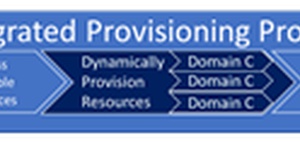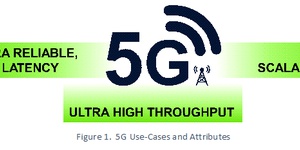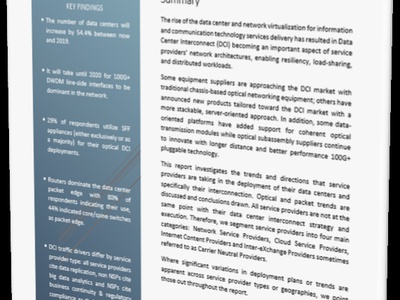
Whitepapers
Trends and Directions in Data Center Interconnect: A Survey of Optical and Packet Mode Networking Practices
This ACG Research report investigates the trends and directions that service providers are taking in the deployment of their data centers and specifically their interconnection. It provides insight into existing data centerpractices as well as future practices. The survey report connected directly with service providers utilizing data center interconnect equipment or planning to deploy such equipment to interconnect their data centers in the next 12 months. Respondents included Network Service Providers, Cloud Service Providers, Internet Content Providers and Inter-eXchange Providers in the APAC, EMEA, NA and LAC regions.
“We confirmed our previously held belief that the number of data centers will grow approximately 60% between now and 2019,” says Tim Doiron, principal analyst, Intelligent Network Services. “We determined that the types of products (SFF or multi-slot chassis) and desired product attributes differ based upon the service provider segment. Data center optical reach demonstrates a bimodal distribution with maxima below 30km and above 600km distances. Traffic drivers for DCI bandwidth also differ by service provider segment.”
Contactkgrenier@acgcc.comto purchase the report.
You might like similar whitepapers


The Economic Benefits of the Ciena Virtualized Edge Solution

Key CommSoft Learnings from #MWC19

Middle-Mile Networks Capacity Requirements for Fixed Broadband

Understanding VRAN

The Evolution of Broadband Traffic: A Forecast for the Americas, EMEA, and APAC Regions

Coriant’s Multi-Sided Platform Partner Program: Market Impact Report

AUTONOMOUS NETWORKS: NOW IS THE TIME

AUTONOMOUS NETWORKS POWER INDUSTRY 4.0

Building Open, Scalable Service Delivery Infrastructures

Accelerating Revenue and Innovation in CSPs' Distributed Clouds

Simplifying IP Networks

An Approach to Offering Profitable Managed Network Services

Global Pricing for SD-WAN

Meet Market Needs with Software-Enabled Solutions

Propelling Operators to L3 Operations Autonomy and Beyond with Huawei ADN

A TCO Comparison of Private WANs vs Managed Network Services for Enterprises

Hybrid Networks: Integrated Provisioning for Virtual and Physical Networks

MODERNIZING THE CABLE SERVICE DELIVERY INFRASTRUCTURE

Delivering Policy Continuity at Scale in Cloud IT and Managed Network Services

Virtualization Journey: Cable Companies Are on Their Way

5G Service Assurance: The Case for AIOps

The Economic Benefits of Automating Capacity Optimization in IP Networks

ECONOMIC BENEFITS OF THE VMWARE TELCO CLOUD AUTOMATION AND HORIZONTAL INFRASTRUCTURE

The Economic Benefits of Distributed Broadband Services

The TCO Benefits of Dell’s Next-Generation Telco Servers

Huawei Autonomous Driving Network: Standards-Based but Differentiated

Itential Vendor Profile: Automation and Orchestration for Multi-Domain Networks

Coriant Groove™ G30 Disaggregated Platform Update: Market Impact Report

Broadband Access Transformation

Orchestrating Dynamic Enterprise Services

The Right Container Platform(s) for Modern OSS and BSS

Segment Routing: An ACG Research Whitepaper

Using Open Virtual RANs in 5G

Comparing Broadband Network Architectures in the Evolving Connectivity Landscape

The Economic Benefits of Virtual Edge Services

Building the Business Case for AI in Wireless Networks: Juniper Mist AI TCO Report

The Economic Benefits of a Super-Converged Multi-Access Edge Network

TCO Benefits of Converged 5G Ready IP Transport

Next-Generation Cloud Metro Network Requirements and Architectures

AUTOMATING 5G ACCESS DEPLOYMENTS

Maximizing Efficiency Using Standards-Based, Model-Driven Infrastructures in NFV Deployments

The Missing Guide in SP Managed Services Profitability

The TCO Benefits of Distributed Broadband Services with CUPS

Tunnel-Based versus Tunnel-Free SD-WAN

Disruption Propelling Massive Changes in Video Market

Mitigating Market Challenges in Telecommunications




